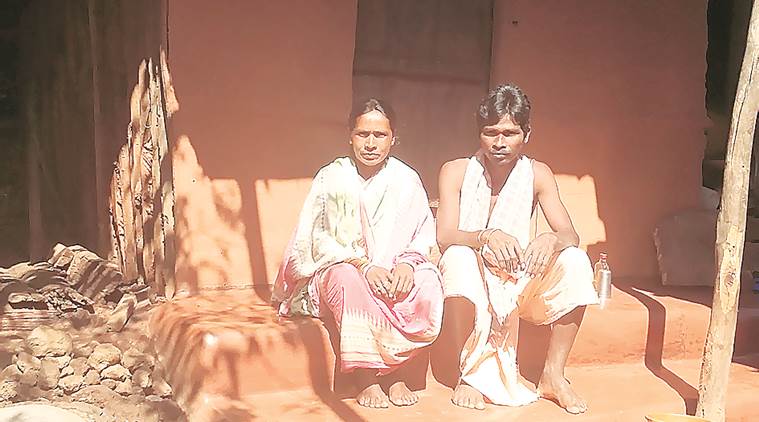- India
- International
Low prices, stringent trade laws and the struggling mahua collectors of Odisha
Villagers of Madhikhol and Palehi in Phulbani block say they used to get decent prices, up to Rs 25 a kilo, but traders have been exploiting the lack of a price-protection mechanism.
 Ramabhabati, Shankara in Madhikhol village, Kandhamal. Sampad Patnaik
Ramabhabati, Shankara in Madhikhol village, Kandhamal. Sampad Patnaik
Nineteen quintals of dried mahua flowers, once chestnut-brown, are turning into a blackish mass in Madhikhol village of Odisha’s Kandhamal district, with tribal villagers unable to sell them in local markets this year. Mahua flowers are rich in sugar and grow on Bassia latifolia or Bassia longitolla trees. These flowers are eaten as cooked vegetables, dried and ground into bread, made into jam, mixed raw in cattle fodder, and also used to extract liquor.
Villagers of Madhikhol and Palehi in Phulbani block say they used to get decent prices, up to Rs 25 a kilo, but traders have been exploiting the lack of a price-protection mechanism. “Our hard work in picking, drying and storing them has gone to waste,” says Rambhabati Kanhara, 45, member of a self-help-group that gathered flowers. “Our SHG bought 19 quintals from village women at Rs 20 per kilo. Can we not expect Rs 22? But traders have offered Rs 16-18,” she says.
Her husband, Sankara, 45, says, “The state government has not included mahua under the minimum support price mechanism. Traders in Phulbani town loot us.”
“Mahua flowers are difficult to gather, and harder to transport through these mountainous, potholed roads,” says Rasmita Bindhani, 24, member of Madhikhol’s SHG. “Some traders agree to help us break even but once we reach Phulbani town, they offer lower prices as they know we cannot carry it back.”
Mahua is not eligible for MSP under the Centre’s Mechanism for Marketing of Minor Forest Produce through MSP, and Development of Value Chain for MFP. Over 75% of tribal households in Odisha collect mahua but do not receive fair prices, as per a 2011 study by the Panchayati Raj Ministry.

Odisha stringently regulates sale. Under the Excise Rules (2017), “storage or possession of mahua flower… shall remain open for inspection at any time by day or night by any officer of the Excise or Police Department”. As per the Excise Policy of 2017-18, producers or liquor shop owners pay Rs 8,730 per quintal mahua stored up to 500 quintals; traders pay Rs 15,000 per quintal up to the same amount. The fees rise for higher amounts. The government also earns revenue from mahua transportation and tax on mahua liquor. Excise officers in Bhubaneswar did not respond to queries on the revenue earned.
“The liquor prohibition movement prevents MSP for mahua flowers,” says a former chief secretary. “To show solidarity with women, the government tightly regulates mahua and earns revenue. Traders take advantage of the lack of MSP to drive down prices. Tribals get nothing, even when mahua sold is for non-alcoholic use.”
Apr 16: Latest News
- 01
- 02
- 03
- 04
- 05






































